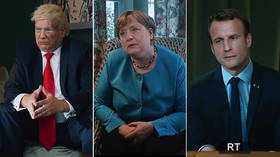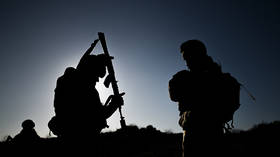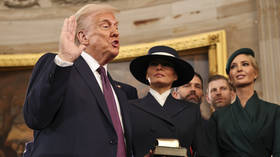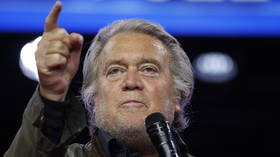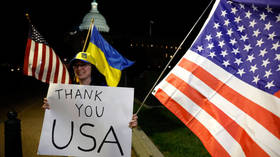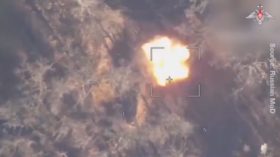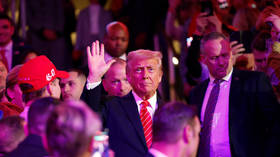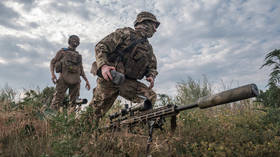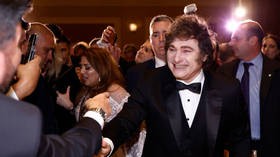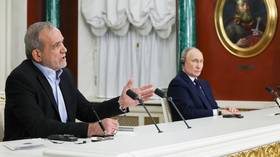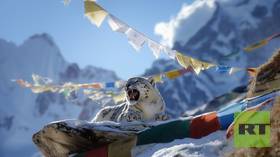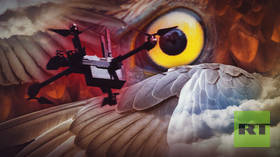MSNBC’s report on ‘Chinese super-soldiers’ proves the shady relationship between the US media and the CIA is alive and well

Ken Dilanian’s claims about China’s alleged efforts to create “hyper-snipers that see twice as far as ordinary humans” is the latest demonstration of how intertwined the MSM and the intelligence community have been for decades.
The MSNBC reporter said the Chinese government was conducting experiments aimed at producing super-soldiers with enhanced capabilities. Dilanian apparently based his report on statements by outgoing Director of National Intelligence John Ratcliffe in an op-ed in the Wall Street Journal, in which Ratcliffe declared that China was “National Security Threat No. 1.”
But Dilanian’s report, and comments he made in an interview with his own channel, contained details that didn’t appear in Ratcliffe’s op-ed, including that China is trying to develop hyper-snipers who can “see twice as far as ordinary humans” and “super-strong commandos.”
This begs the question: where did Dilanian get this idea, and was his report shaped by his close relationship with US intelligence?
Also on rt.com 'You alone can SAVE HIS LIFE': NSA whistleblower Edward Snowden urges Trump to grant clemency to WikiLeaks' Julian AssangeDilanian’s deep-state dalliance
In 2014, Dilanian was outed by online ‘adversarial’ platform the Intercept as having a close relationship with the CIA’s office of public affairs, leading to him being disowned by the L.A. Times. The Intercept’s investigation, based on released CIA emails, found Dilanian routinely sent his articles to the Agency for vetting prior to publication, promised it positive coverage, and sometimes rewrote his pieces at their behest.
In one email, he told them he was working on a story about congressional oversight of drone bombings, saying it “presents a good opportunity for you” and that his story would be “reassuring to the public.” He included in the article the claim that a drone strike that killed Al-Qaeda leader Abu Yahya al-Libi hadn’t killed any civilians, and even sent these sentences to the CIA for approval.
In reality, early news reports, an investigation by Amnesty International and another by the Bureau of Investigative Journalism, all pointed to several civilian deaths in the initial strike, as well as follow-up strikes on civilians and rescue workers.
How often does this happen, and how long has the CIA been involved in American news media, currying favour with journalists to protect their public image?
Also on rt.com Caitlin Johnstone: Biden's prospective new defense secretary is another professional war profiteerIn the beginning
The CIA established a close working relationship with major news figures almost from their inception. Carl Bernstein’s seminal 1977 article ‘The CIA and the Media’ outlined how more than 400 journalists and media figures had worked with the CIA over the preceding decades. They included executives at CBS, ABC, NBC, Time, Newsweek, Reuters, and the New York Times. In some cases, journalists were actually on the CIA payroll; in others, they acted as agents of influence out of loyalty to the Agency and the country.
Bernstein explained: “In the field, journalists were used to help recruit and handle foreigners as agents, to acquire and evaluate information, and to plant false information with officials of foreign governments.” He elaborated: “On other occasions, their assignments were more complex: planting subtly concocted pieces of misinformation, hosting parties or receptions designed to bring together American agents and foreign spies, serving up ‘black’ propaganda to leading foreign journalists at lunch or dinner, providing their hotel rooms or bureau offices as ‘drops’ for highly sensitive information moving to and from foreign agents, [and] conveying instructions and dollars to CIA-controlled members of foreign governments."
This relationship extended to domestic propaganda and censorship. In 1956, the CIA became aware that a New York company called Flamingo Films was planning to make a series of TV documentaries about the Office of Strategic Services (OSS), the CIA’s predecessor organization. According to a high-level memo, the Agency found out about the Flamingo Films project via CBS Vice President Larry Lowman, a former OSS man and an unofficial CIA asset.
The CIA wanted to keep a lid on old OSS covert operations, because the majority of its staff had worked there during World War II. It engaged the help of CBS – founded by another OSS veteran, William Paley – to develop a competing TV documentary series to bigfoot Flamingo Films out of the market. The CIA then pulled the plug on the CBS series, ensuring both documentaries were spiked.
Also on rt.com ‘Most honest reporting MSNBC has ever done’: Network provides election distraction with clip of correspondent cursing live on airHacking the hacks
The Agency also carried out illegal surveillance of journalists who wrote critical stories about the CIA. These included famed investigative reporter Jack Anderson, who wrote multiple stories on the CIA’s efforts to assassinate Fidel Castro, among other potentially illegal CIA activities.
The ‘Family Jewels’ documents list 18 issues that CIA director William Colby discussed with the deputy attorney general, Laurence Silberman, in late 1974, including, “Wiretapping of two syndicated columnists, Robert Allen and Paul Scott,”“Physical surveillance of muckraker Jack Anderson and his associates, including current Fox News anchor Brit Hume,” and “Physical surveillance of then Washington Post reporter, Michael Getler.”
The CIA were simultaneously cosying up to journalists and newspaper proprietors to try to generate more positive reporting on the Agency. A 1965 memo reveals efforts made over several years by Ray S. Cline, at the time the deputy director for intelligence, to get American journalists to aid the CIA’s efforts to restore “diminishing faith in the Agency’s competence.”
This included regular contacts with syndicated columnist Joseph Alsop and his brother Stewart, yet another OSS veteran. The memo lists 20 journalists and newspaper publishers who “have had the benefit of Mr Cline’s viewpoints,” and details dozens of meetings with them over the years.
Also on rt.com 'Manipulative BULLS**T': Glenn Greenwald defends calling NBC a CIA mouthpiece, mocks accusation of 'endangering journalists'Ben Bradlee and the Agency
Another unofficial asset in the media was Bernstein’s former editor at the Washington Post, Ben Bradlee. In 1951, Bradlee got his first writing gig as a press attaché to the US Embassy in Paris. The following year, he joined the US Information and Education Exchange (later the USIA, US Information Agency) – a propaganda unit within the embassy that worked closely with the CIA. According to a Justice Department memo that surfaced during the trial of the Rosenbergs, two Americans convicted of spying for the Soviets in the early 50s, “Bradlee promulgated CIA-directed European propaganda urging the controversial execution of the convicted American spies Ethel and Julius Rosenberg.”
In 1957, having officially left government service and now working for Newsweek, Bradlee interviewed members of the National Liberation Front (FLN), the Algerian insurgents who were rebelling against the French government of Charles de Gaulle – a government with which the US had many disagreements. According to Deborah Davis, who later wrote a biography of Washington Post proprietor Katharine Graham, Bradlee’s interviews with the FLN had all the “earmarks of an intelligence operation [sic].” Following the interviews, Bradlee was forced to leave France.
The CIA’s CREST database (‘CREST’ stands for CIA Records Search Tool) includes media coverage of Bradlee’s expulsion, as well as articles he wrote on the Rosenbergs. It also includes a number of internal documents on Bradlee, and letters between him and several directors of the CIA from his time as editor of the Washington Post.
One memo, from 1961, to director Allen Dulles, notes how Bradlee became bureau chief at Newsweek, and provided an update on a story that profiled Dulles and assessed the effectiveness of the Agency. The implication is that Bradlee was still working for the CIA at this point and was providing updates on the development of the article.
Years later, it seems the CIA-Bradlee relationship was still intact. A memo from 1977 to director Stansfield Turner suggested the CIA use Bradlee as an informal consultant to help it better understand how information was being leaked to the press.
The CIA-Bradlee relationship appears to have continued into the 1980s, as outlined by Nicholas Schou in his book ‘Spooked: How the CIA Manipulates the Media and Hoodwinks Hollywood’. In 1982, Bob Woodward was investigating a story about the CIA arming and training the Contras – an ultra-right-wing terrorist organisation fighting the Sandinista government of Nicaragua. As recorded by Schou, this story was never published because Bradlee nixed it, telling Woodward “the story was only news if the Agency was doing so behind Reagan’s back.”
Also on rt.com Will Robert Peston/MSM question UK government rules more after finding lockdown 2 was based on dodgy data? I wouldn't bet on itFingers in every pie
By the early 1990s, CIA documents record how its Office of Public Affairs “now has relationships with reporters from every major wire service, newspaper, news weekly, and television network in the nation. This has helped us turn some ‘intelligence failure’ stories into ‘intelligence success’ stories ... In many instances, we have persuaded reporters to postpone, change, hold, or even scrap stories.”
As Schou explains in ‘Spooked’, it was this network of friendly reporters across the US that helped the CIA trash investigative journalist Gary Webb after his ‘Dark Alliance’ series exposed the Agency’s role in allowing the Contras to flood the US with cocaine during the 1980s. Webb’s reputation was ruined and his reporting criticised and contradicted by an army of CIA-associated journalists, including the Washington Post’s Walter Pincus, himself a former CIA informant. This vicious character assassination destroyed Webb’s family and his career and, ultimately, led to his suicide. However, Schou points out, a CIA inspector general’s report into the CIA-Contra-cocaine question published in 1998 “revealed far more Agency complicity with drug dealers” than Webb’s reporting had done two years earlier, effectively admitting Webb was right all along.
The willingness of the US news media to kowtow to the CIA continues. In 2011, New York Times columnist Maureen Dowd was writing about the CIA’s support for the movie ‘Zero Dark Thirty’ and asked her colleague, Mark Mazzetti, to look over it before publication. Mazzetti sent the whole column to the CIA for approval, after the Agency let him know they would like to see it. Mazzetti’s email to CIA public affairs officer Marie Harf said, “This didn’t come from me … and please delete after you read. See, nothing to worry about.”
In another episode recounted by Schou, Newsweek’s Jeff Stein had worked up a story that the CIA, not Israeli intelligence, as had been widely presumed, were behind the 2008 assassination of Hezbollah leader Imad Mugniyah. After running the story past the CIA, which asked them to kill it, Stein’s editors sat on the article for over a year. Then the Washington Post got the same story, prompting the CIA to ask Newsweek if it intended to publish what it had. When Newsweek said it did intend to run it, the CIA let the Washington Post know, allowing it to scoop Newsweek as punishment for Stein having got the story in the first place.
More recently, a CIA document released to me under the Freedom of Information Act that details the activities of its office of public affairs contains numerous references to journalists being invited to the CIA HQ at Langley and other venues for special briefings. These covered everything from Boko Haram to nuclear security to Russia and Libya. Among the journalists invited to an August 2014 briefing on 'the rise of ISIL and its impact on the global jihad' were David Ignatius, Eli Lake, Barbara Starr and – of course – Mark Mazzetti and Ken Dilanian.
Also on rt.com White Helmets founder Le Mesurier is now a mainstream saint, but leaked docs raise questions about his widow's roleThe man from M.S.N.B.C.
All of which sparks the question as to how we should interpret Dilanian’s recent article and interview on Chinese super-soldiers. Was he encouraged by the Agency to pursue this aspect of Ratcliffe’s op-ed to help maintain the image of China as a major – or possibly the major – threat facing America? If so, that would explain why Dilanian’s comments completely failed to draw comparisons with the US military’s own super-soldier programs including the Defense Advanced Research Projects Agency’s biological technologies office, which was founded in 2014.
By focusing solely on China’s alleged efforts in “enhanced human operations,” Dilanian was able to present an exceptionally one-sided version of the military deployment of transhuman technological developments. Perhaps more importantly, it also allowed him to push the fear factor, and continue the US media’s steady ramping-up of mutual paranoia and hostility between the US and China.
Think your friends would be interested? Share this story!
The statements, views and opinions expressed in this column are solely those of the author and do not necessarily represent those of RT.



